The Role of Rest and Recovery in Fitness Success
The Role of Rest and Recovery in Fitness Success
Hello, dear readers,
Welcome back to another insightful blog post. Today, we're delving into a topic that often takes a back seat in our fitness journey: the crucial role of rest and recovery. Let's explore how giving your body the time it needs to rest can be a game-changer for your fitness success.
Understanding Rest and Recovery:
Rest and recovery refer to the periods of time when you allow your body to recuperate from the physical stress of exercise. While pushing yourself during workouts is essential, so is providing your body with the opportunity to heal and rebuild.
The Benefits of Rest and Recovery:
Muscle Repair and Growth: During rest, your body repairs the micro-tears in muscle fibers caused by exercise. This repair process is what leads to muscle growth and increased strength.
Injury Prevention: Regular rest days reduce the risk of overuse injuries. It gives your joints, ligaments, and tendons a break from repetitive stress.
Energy Restoration: Physical activity depletes energy stores. Adequate rest allows your body to replenish glycogen levels, ensuring you have the energy for your next workout.
Mental Recharge: Rest not only rejuvenates your body but also your mind. It helps prevent burnout and keeps you motivated and mentally sharp.
The Different Types of Rest and Recovery:
Active Recovery: Light, low-intensity activities like walking or gentle yoga help promote blood flow and aid in recovery without putting additional strain on your muscles.
Sleep: Quality sleep is essential for physical and mental recovery. Aim for 7-9 hours of sleep each night to optimize your body's healing processes.
Nutrition: Proper nutrition supports recovery. Consuming a balanced meal with protein, carbohydrates, and healthy fats after a workout aids muscle repair.
Hydration: Staying hydrated is vital for recovery. Water helps transport nutrients to cells and flushes out toxins.
Listening to Your Body:
Pay attention to your body's signals when it comes to rest and recovery:
Soreness: Mild soreness is normal after a workout, but excessive soreness that persists may indicate you need more recovery time.
Fatigue: Feeling consistently tired or lacking motivation may indicate you're not giving your body enough time to recover.
Lack of Progress: If you're not seeing improvements or even experiencing a decline in performance, it could be a sign that you need more rest.
Balancing Intensity and Recovery:
Remember, progress doesn't happen solely in the gym. Your body transforms during rest, so it's vital to strike a balance between challenging workouts and ample recovery time.
In a world that glorifies constant hustle, giving yourself permission to rest might feel counterintuitive. However, it's an essential part of achieving long-term fitness success. Honor your body's need for rest, and watch how it pays off in the form of increased strength, endurance, and overall well-being.
Thank you for joining me on this exploration of the role of rest and recovery. Remember, self-care is an integral part of any successful fitness journey.
Warm regards,
Miguel Silva
Products:
🌿 The Power of Hemp Oil: Infused with the natural benefits of hemp oil, this cream is formulated to soothe and nourish your joints and muscles. Experience the holistic wellness that hemp has to offer.
Relax, rejuvenate, and regain your freedom of movement – order your Hemp Cream Relief Pro today and embrace a life free from joint and muscle discomfort!
This Link will take you directly to amazon.com
https://amzn.to/3sTebxS









Comments
Post a Comment